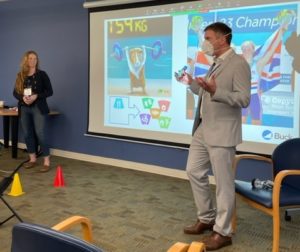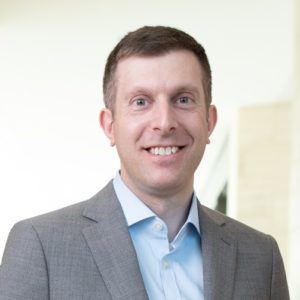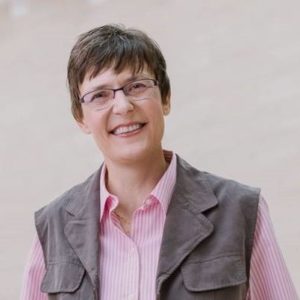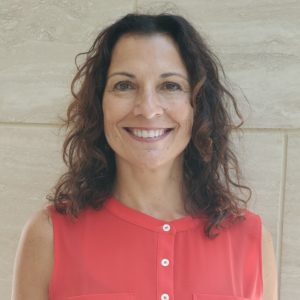by Buck Institute
June 15, 2022 . News
The Buck’s Impact Circle supports a first-ever pilot study to look at the effects of a ketogenic supplement in older adults
This year the Buck’s Impact Circle chose to support the first-ever clinical study to be done at the Buck Institute. The award of more than $120,000 will enable researchers to test blood biomarkers in a small group of older adults who will take a nutritional supplement designed to put the body into ketosis. Strong evidence in mice indicates that ketone bodies, which are produced when the body is starved of carbohydrates, have a positive effect on multiple hallmarks of aging, including oxidative stress, inflammation and mitochondrial function.
 “Ketone esters have been mainly studied in the context of healthy young adults,” said Buck assistant professor John Newman, MD, PhD, who will co-direct the trial, which has been dubbed BIKE: Buck Institute Ketone Ester study, together with the Buck’s Lead Translational Scientist Brianna Stubbs, PhD. “We are so grateful for the Impact Circle’s support of this first attempt to directly link nutritional ketosis to aging biomarkers. We think this project will provide breakthroughs, both in the field of aging research, and in the Buck’s overall efforts to engage in clinical trials,” said Newman
“Ketone esters have been mainly studied in the context of healthy young adults,” said Buck assistant professor John Newman, MD, PhD, who will co-direct the trial, which has been dubbed BIKE: Buck Institute Ketone Ester study, together with the Buck’s Lead Translational Scientist Brianna Stubbs, PhD. “We are so grateful for the Impact Circle’s support of this first attempt to directly link nutritional ketosis to aging biomarkers. We think this project will provide breakthroughs, both in the field of aging research, and in the Buck’s overall efforts to engage in clinical trials,” said Newman
Now in its 10th year, the Impact Circle is a group of like-minded philanthropists who advance scientific discovery at the Buck by pooling their resources to provide seed money for early stage projects. In addition to the satisfaction of supporting ground-breaking research (and tracking its success), they also get a front row seat on the scientific process.
Long-time Impact Circle members Allan and Sydne Bortel are particularly happy with this year’s choice, given that both of them have Alzheimer’s disease in their families. “We like to lean toward anything that could have an impact on brain health,” said Allan, a retired financial securities analyst. “The project seemed experiment-ready and simple enough to move into humans. We’re very excited to support the Buck’s first clinical trial and look forward to getting updates about what is discovered.”
Adding blood biomarkers to the mix
The BIKE trial, which is expected to begin in the fall, is being largely funded by a major donor who wishes to remain anonymous. Thirty older adults (65+) will be recruited for a double-blind, placebo-controlled trial which will last for 12 weeks. The study will collect measures of safety, tolerability, physical and cognitive function and quality of life. The Impact Circle award will allow researchers to go further, by enabling an examination of blood samples from study participants for biomarkers of biological aging mechanisms thought to be affected by ketone bodies. Researchers will measure markers of inflammation, oxidative stress, and mitochondrial function, as well as epigenetic clocks.
“In the laboratory Ketone bodies interact with these mechanisms of aging in mice. Now for the first time we’ll start to see if they have the same impact in humans. We need blood aging biomarkers in order to show how the ketone ester is working and move into next-phase studies funded by the National Institutes of Health,” said Newman. “Our ultimate goal is to do a study involving several hundred people in three centers around the country that will change the way we view and use ketone bodies in aging. I can’t emphasize enough how important the Impact Circle’s support is in this regard.”
 Stubbs has first-hand experience with clinical trials involving ketone bodies. She was a study subject herself as a grad student in the United Kingdom when she was an elite rower who won the World Championships twice with Great Britain. She went on to get her PhD in metabolic biochemistry. “What’s exciting about this upcoming trial is that we want to involve ordinary people in it,” said Stubbs. “Our best case scenario is that we are able to validate the fact that older people can reap the benefits of ketosis without having to change their diets.”
Stubbs has first-hand experience with clinical trials involving ketone bodies. She was a study subject herself as a grad student in the United Kingdom when she was an elite rower who won the World Championships twice with Great Britain. She went on to get her PhD in metabolic biochemistry. “What’s exciting about this upcoming trial is that we want to involve ordinary people in it,” said Stubbs. “Our best case scenario is that we are able to validate the fact that older people can reap the benefits of ketosis without having to change their diets.”
 Newman, who is also a practicing geriatrician at the San Francisco VA Medical Center, has a particular interest in how ketone bodies work in older adults. He wants to see if they could help hospitalized older adults avoid delirium, a sudden change in mental status that is often characterized by confusion, disorientation and sometimes hallucinations. Newman was the lead author of a study in Cell Metabolism in 2017 which showed that a ketogenic diet improved both healthspan and memory in aging mice. “While I enjoy being a mouse doctor in the lab, I am really eager to see what ketone bodies and other geroscience interventions can do in humans,” he said.
Newman, who is also a practicing geriatrician at the San Francisco VA Medical Center, has a particular interest in how ketone bodies work in older adults. He wants to see if they could help hospitalized older adults avoid delirium, a sudden change in mental status that is often characterized by confusion, disorientation and sometimes hallucinations. Newman was the lead author of a study in Cell Metabolism in 2017 which showed that a ketogenic diet improved both healthspan and memory in aging mice. “While I enjoy being a mouse doctor in the lab, I am really eager to see what ketone bodies and other geroscience interventions can do in humans,” he said.
Those interested in receiving updates about the BIKE study should email: BIKE-Study@buckinstitute.org. The study will involve North Bay residents 65 or older. Recruitment is expected to begin this fall.
More from members of the Impact Circle
 In addition to helping fund the BIKE trial, Impact Circle members Alex and Robert Griswold are donating $30,000 to support one of the other Impact Circle projects which is spearheaded by associate professor Birgit Schilling, PhD. Schilling will create a new 3-dimensional human tissue model of cartilage (“knee in a dish”) to screen drugs and develop optimized treatments for osteoarthritis. Schilling’s team, which will include Buck professor Judith Campisi, will focus on the role senescent cells play in the development of age-related osteoarthritis. The team will also study the therapeutic benefits of clearing the cells, which are linked to chronic inflammation in many age-related diseases. The hope is that the new laboratory model, which will closely mimic what really happens in human diseased or aged joints, will increase the success of future clinical trials in human patients.
In addition to helping fund the BIKE trial, Impact Circle members Alex and Robert Griswold are donating $30,000 to support one of the other Impact Circle projects which is spearheaded by associate professor Birgit Schilling, PhD. Schilling will create a new 3-dimensional human tissue model of cartilage (“knee in a dish”) to screen drugs and develop optimized treatments for osteoarthritis. Schilling’s team, which will include Buck professor Judith Campisi, will focus on the role senescent cells play in the development of age-related osteoarthritis. The team will also study the therapeutic benefits of clearing the cells, which are linked to chronic inflammation in many age-related diseases. The hope is that the new laboratory model, which will closely mimic what really happens in human diseased or aged joints, will increase the success of future clinical trials in human patients.
 Lisa Palma, Director of Philanthropy, is particularly grateful for a somewhat return-to-normal for the Impact Circle. This year’s event was a hybrid; members gathered both in-person and on Zoom. “The enthusiasm for our research never faltered during the depths of the pandemic, which is a testament to the work being done in our labs,” she said. “It’s always a thrill to connect our scientists with this group of engaged donors. Everyone benefits from the interaction.”
Lisa Palma, Director of Philanthropy, is particularly grateful for a somewhat return-to-normal for the Impact Circle. This year’s event was a hybrid; members gathered both in-person and on Zoom. “The enthusiasm for our research never faltered during the depths of the pandemic, which is a testament to the work being done in our labs,” she said. “It’s always a thrill to connect our scientists with this group of engaged donors. Everyone benefits from the interaction.”
Sydne Bortel, a retired clinical social worker, says getting to know Buck scientists is part of what keeps her and her husband engaged with the group. “From the beginning we were fascinated to think we could have an actual influence on what was going to be studied at the Buck. Meeting and enjoying the scientists and getting a greater understanding of their research is a huge plus. It helps keep us smart.”
Membership in the Impact Circle remains open. Because the clinical trial is scheduled to begin in the fall, joining the Impact Circle now means new members still get to enjoy a full-year of member benefits, which include regular progress reports as well as invitations to online and in-person lab updates from the scientists. Those interested in getting involved should contact Lisa at lpalma@buckinstitute.org.
This study mentioned in this article is paid for by philanthropic funds donated to the Buck Institute for Research on Aging. All study staff are employees of the Buck Institute. Dr. John Newman, the study investigator, and Dr. Brianna Stubbs, a study investigator, own stock in BHB Therapeutics, LTD, the company providing the product being studied, and are inventors on patents that relate to the product being studied. The Buck Institute also has an ownership interest in BHB Therapeutics.
Science is showing that while chronological aging is inevitable, biological aging is malleable. There's a part of it that you can fight, and we are getting closer and closer to winning that fight.
Eric Verdin, MD, Buck Institute President and CEO